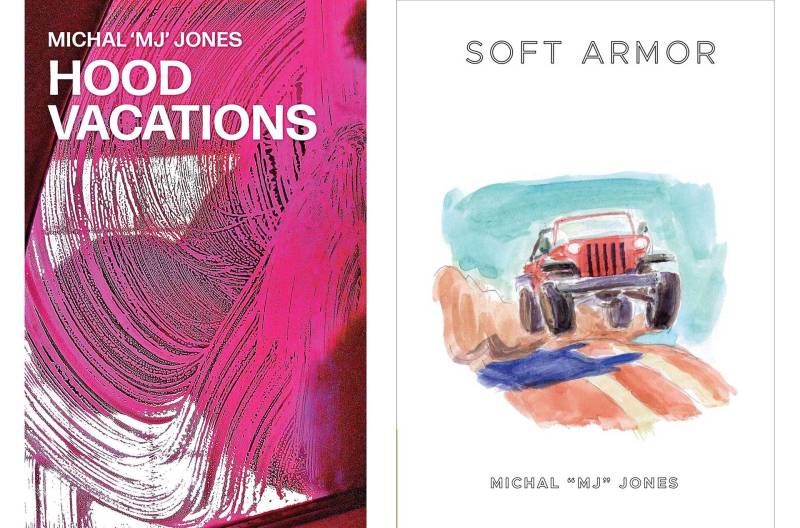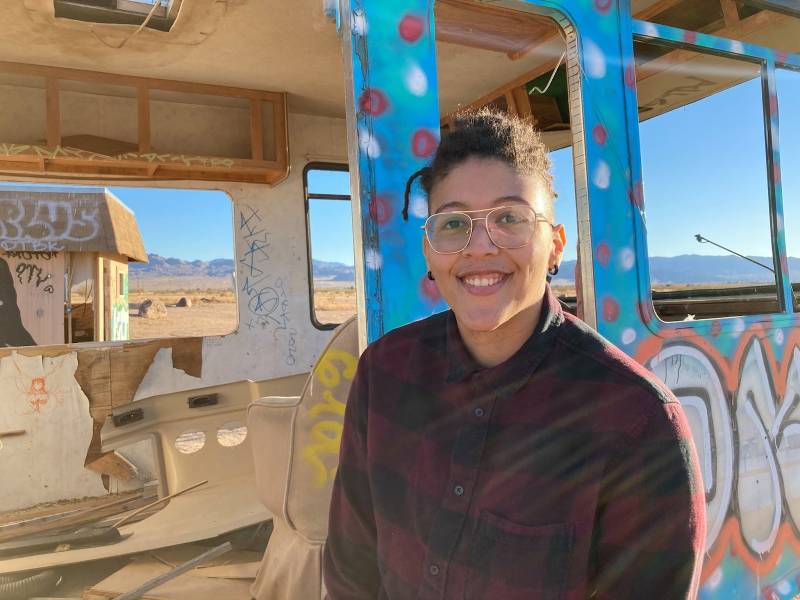Michal “MJ” Jones: I went through a couple stages of submitting to places and having the work accepted, but wanted to find the right fit. I did with Black Lawrence [Press, for Hood Vacations], and yeah, I’m weirdly bad at self-promotion, so I haven’t really processed being a published author. But it’s really meaningful to be able to hold the books. I have been a writer since I was a child and always dreamt of having a published book, so that’s meaningful.
How do you define your voice as a poet?
I guess I’m a lyrical poet in the sense that I am literally being influenced by music. I am also a musician, singer and songwriter, and music has been very informative. In fact, Hood Vacations was primarily written using the music my father would play me. Because we would be on the road for like 8 to 15 hours at a time, depending on where we were going. We’d hear zydeco, jazz, soul, Motown, folk music, hip-hop – literally everything. So there is a certain rhythm and assonance and mouthfeel [to my work]. That’s very important to me and I think just how I naturally express myself in poems.
What’s the story behind all your road tripping as a kid?
I grew up in Michigan until I was 12. My parents separated when I was younger and my dad would take us to visit his family in Philly. And we would be on the road with him all the time because his job required a lot of travel. So we would drive out to Colorado and Kentucky – wherever he was working in the summers. So I got to see a lot of different parts of the country. And then moved out here to Berkeley with my mom when I was 12 or 13.

Tell us about the books, and what each project represents for you.
I started writing the poems for Hood Vacations over the course of three or four years, starting in 2018. It was shortly after my son was born and I was having insomnia and just like, if I’m going to be up, I’ll write some poems. So those poems came to me around then for several years.
It tackles a lot of political things: race, colorism, gender, sexuality, class – through the lens of my family. One of the motifs of Hood Vacations is the road trip and how important travel was as a child. Traveling into different stages of Blackness or moving through privilege. The title Hood Vacations comes from a line in the poem “Rita’s on Stenton”: You take hood vacations, you don’t stay there.
And the poems from Soft Armor – they’re just vastly different. Basically, what happened with Soft Armor was I fell in love and met the love of my life. And those poems came very unexpectedly. It was really more of a channeling, like vignettes that just came and had very little revision to them. So super, super close to my essence. It’s also probably the most vulnerable that I’ve been in my writing.
Soft Armor has a lot of poems about loving Sedona, Arizona, and poems about loving the redwood trees in Oakland. It’s a very place-based text, and a lot of my poems [overall] are place-based and talking about the political realities of the place and also just the connection and love of nature and how it ties to romantic love, familial love, love from my parents, myself to my child, etc. That is something that’s common to both of them: love of place or place as a metaphor.
As I read Hood Vacations, I was moved by the intermingling of the personal and the political across poems, and it made me think about poet and writer June Jordan who, among others, asserted that “the personal is political.” Does that resonate with your own view of your work?
I do agree with the idea of personal as political. Even when a poem is not specifically addressing a political issue, if I am writing it, it is [political], as a multi-marginalized person. I think often we are pigeonholed into writing maybe only about certain topics to the point where maybe we can’t write about anything else. Or it’s like, “well, where is ‘X identity’ in the poem?” if it’s not made explicit. I grapple with that because even in Soft Armor, there are poems about the natural world and it references an aliveness that is fleeting. For me, poems demand aliveness and witness. They demand a specific moment. They demand a reader leaving with something shifting in their own perspective or vantage point.
Can you tell me about your work with the Bay Area-based journal Foglifter and what that community means to you?
Foglifter is a biannual journal that publishes queer and trans LGBTQI2S writers – all the folks in our alphabet. It’s an amazing, mighty queer publication. I actually started off as a contributor and they published my first published poem five years ago. So that’s how I came in and started off as a reader in poetry and then managed the poetry team. And now I’m editor-in-chief. It’s a really good, living example of queering text – hybrid forms that challenge a cis, hetero, white canon. It’s also transgressive. It’s bold. Unapologetic. It’s extremely rewarding to be a part of.
Hearing that Foglifter provided you with the opportunity to be published for the first time makes me think about the significance of creating intentional space for marginalized voices to develop and be heard. That’s something you’ve done through your own workshops for Black queer and trans writers. Can you talk about those?
I called the group Litany! after Audre Lorde’s [poem] “A Litany for Survival.” It’s a passion project and I would really like to get it started up again in the summer. Especially when we are in unprecedented times of anti-trans legislation. There’s never been a time where state, local, federal governments are after people as much as they are now. And so I think the baseline is surviving and creating spaces – spaces outside of the MFA pathway, especially for folks who cannot afford it, or choose not to learn in that way. I say that as somebody who has an MFA [in creative writing from Mills College] – and probably wouldn’t if it wasn’t fully funded, not going to lie.
Another thing that informs my writing, and just like who I am, is community care. So I put out a call at the beginning of the year for Black, queer, trans writers who had not yet published a debut to send me their work and I would edit it for free and consult on how to submit it for publication, etc. Because people need that. I can’t help everybody, but I committed to editing four projects this year. It’s important for me as a literary citizen to do what I can for other people.
What are you excited to explore next with your writing?



